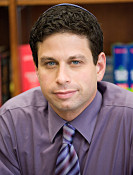The Old Jewish Neighborhood
I live in a Jewish neighborhood called Reservoir Hill. It used to be two communities: Eutaw Place, the grand boulevard with its elegant town homes and Lake Drive, which included several blocks east of Eutaw with still beautiful, but more modest row houses. For a number of reasons, Jews moved away from Reservoir Hill toward Baltimore County. By the 1970’s, the neighborhood was now predominantly African American and increasingly poor. By the 80’s, crime had become endemic and sidewalks abutting the former Jewish shops played host to open-air drug markets. By the 90’s, the entire commercial center of the neighborhood was demolished. Reservoir Hill resembled a bagel with a gaping hole in the middle.
The New Jewish Neighborhood
In recent years, Reservoir Hill has enjoyed a general resurgence and modest Jewish renaissance: young Jewish singles, couples and families have begun to move back. Crime is down, and vacant properties are at their lowest numbers in decades. A team of 350 volunteers built a new playground in 2011 – the community’s first clean, safe play space in years. Whitelock boasts an urban farm and farm stand, a community garden and a new park – the community’s core, empty lots now an emerging as green space. The school, remembered fondly by numerous congregants, is again on the upswing and slated for a total redesign next year. Druid Hill Park across the street, Baltimore’s grand Central Park, once filled with shul-goers from dozens of nearby synagogues on Rosh Hashanah afternoon, boasts a refurbished zoo and conservatory, a new playground and swimming pool, a farmers market and weekend festivals from art fairs to dog-walkers and various ethnic celebrations.
